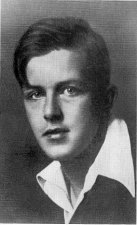
F.L. Lewis Dunbar at the time of his internment 1915-18
(Männerinsel, p. 2)
Gerald Newton, University of Sheffield
There are two main accounts of life in the internment camps in Britain during the First World War. One is by Paul Cohen-Portheim (1880-1932), an artist, opera designer, and author, who wrote from the retrospect of 1931. It is entitled Time stood still. My internment in England 1914-1918. The other account is by F.L. Dunbar-Kalckreuth (1888-1953), and is entitled Die Männerinsel [The Isle of Men]. It is printed in old German typeface (Fraktur), in use till January 1941. Ostensibly this account is taken from diaries Dunbar-Kalckreuth kept in the camps during the War. The date of publication is, however, 1940, the place of publication Leipzig, and some of the entries appear to be too well-rehearsed for them not to have been modified for the purposes of propaganda.
In August 1914, Dunbar-Kalckreuth was in England in order to take a summer-school course in St.-Leonards-on-Sea (Hastings).

F.L. Lewis Dunbar at the time of his internment 1915-18
(Männerinsel, p. 2)
The family name of Frederick Lewis Dunbar is part German, part Scottish, part American. Before internment he seems to have been well-known to the"Upper Ten Thousand", and frequently dined in aristocratic society, even on one occasion (p. 39) meeting Winston Churchill, at that time Lord of the Admiralty, whom he describes as "A very sprightly gentleman, who put me very much in mind of Clewing 1, the actor, but had reddish hair as well as the usual ugly freckles on his face and on his hands."2
Cohen-Portheim and Dunbar-Kalckreuth were just two of the many thousands of Germans who could be found in Britain in August 1914. Many of them were of high repute and of long standing. Some could trace their ancestry back to German merchants who came to Britain in the 17th century, others to the sugar-boilers and bottle-makers, bakers and butchers who arrived later.
By the end of the 19th century, some areas of London such as St. George's-in-the-East, Mile End Old Town, Denmark Hill had in effect become German colonies, so much so that in anticipation of the Silver Jubilee of Emperor William II on 15 June 1913, the Germans in London produced a splendid commemorative volume entitled Die deutsche Kolonie in England :
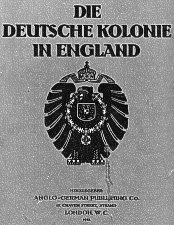
A glance through its pages reveals how deeply associated with British life the Germans had become:
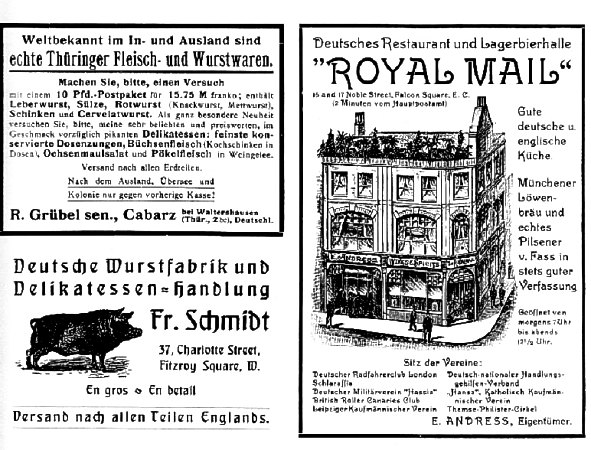
When Britain declared war on Germany on 4 August 1914, the unnaturalised Germans (and Austrians) in Britain, no matter how long their residence, suddenly found themselves designated as "enemy aliens" or "alien enemies". They were told to register themselves at the police station, and not to move more than five miles from where they lived. This became known as the "Five Mile Freedom", any infringement of which without permission was punishable by a £100 fine or six months" imprisonment. The Germans in Britain had suddenly too become the "Hidden Hand", or the "Enemy within the Gates", part of an elaborate system of spies reporting directly to the Kaiser, most of them with their own gun-platforms hidden in their back-yard. By way of underlining the insidious and cunning nature of the "Huns", as the Germans became universally known, popular magazines like John Bull each week published lists of Germans "who were teacherously changing their names from Baumann to Beaumont",4 or less dramatically "Braun" (German spelling) to "Brown" (English spelling). Most of these ideas had been culled from the paranoic spy literature of the time, which had quickened pace after the Kaiser"s telegram to Kruger (3rd January 1896).
But besides the resident German population, there was also a transient one, sailors, mainly from Hamburg, temporary dockworkers, waiters, German band musicians, pork butchers' assistants, Germans from the colonies who had been unfortunate enough to pass by a British ship on the High Seas, or to land at Gibraltar. These were the first ones to be "rounded up" and sent to hastily constructed detention camps.
However, after the initial flush of activity in 1914, many Germans who had been caught in the first round-up were in fact once more released, or put on parole, largely because of lack of space to accommodate them or an unwillingness to tie up the Army on the guard duties involved.5 Nine months later, all this changed on 7 May 1915, when a German submarine sank the British prestige liner RMS Lusitania, with the loss of nearly 2,000 lives, amongst them women and babies. At that point mob violence erupted against anything and everything German, and led to an immediate stepping up of the internment policy. From 13 May 1915, all unnaturalised enemy alien adults aged between 18 and 50 were to be interned "for their own safety and that of the community".6
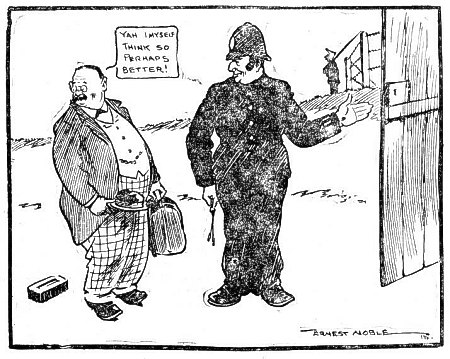
P.C.. J.B. (to alien enemy): Sorry to trouble you, but it is to our mutual advantage.
(Sheffield and Rotherham Independent, May 1915)
Typical newspaper reports of the time are as follows: (example from the Sheffield and Rotherham Independent, Thusday 13 May 1915, p. 1):
Yesterday afternoon 152 German residents of Liverpool who have been collected for internment, were dispatched under military escort to Hawick [Scotland]. They represented all classes of tradesmen, and were nicknamed the "Pork Butchers" Battalion". From an early hour yesterday morning detectives were busily occupied all over London in rounding up alien enemies of both sexes. Many of the enemy naturally conformed without protest to the wishes of the police, but in more than one instance, chiefly amongst unregistered Germans, it was found that the Government"s action had been "intelligently" anticipated. One club, the nightly rendezvous of foreign waiters, mostly Austrians, was deserted. German women, employed in the capacity of temporary waitresses in the more modest eating shops in the thoroughfares off Oxford street, had also decamped.
Amongst those rounded up at this time were also non-naturalised German academics, whose number included Dr. Albers of Manchester University, and Julius Freund, Professor of German at the University of Sheffield, who went off into internment on 1 July 1915. At Christmas the following year, the University of Sheffield terminated its connection with Freund altogether, on the grounds that: Professor Freund has been interned as an unnaturalised alien enemy since July 1915, and he has been unable to discharge the duties of his office as Professor of German.7
The camp to which Freund was initially sent was at Handforth in Cheshire, but camps were scattered all over Britain. The main camps, however, were in London, at Stratford and Alexandra Palace, and on the Isle of Man, at Knockaloe and Douglas. In the time immediately following the sinking of the Lusitania, there were also two internment ships, "HMT Royal Edward"8 and "RMS Saxonia", anchored off Southend.
The reputation of the camps preceded them. In the early days of November 1914 at Douglas Camp, which had been converted quickly from being Joseph Cunningham"s holiday camp for young men, founded in 1893, with the purpose of purveying "good clean fun"(Drower 1982), there had been a riot in camp dining room. This had begun when the internees refused to go to their tents because of a complaint about weevils in the rice. The tents were in any case Cunningham"s, and not intended to stand up to the November dampness. There had been rumours that the sailors amongst the internees had plans to steal a packet-steamer and escape to Germany, and when it looked as though the rioters were about to break out of the camp, the guards began to fire into the crowd. The result was five German dead: Richard Fohs, a waiter from the Grand Hotel Brighton, Christian Bockl, a waiter from London, Richard Matthias, a sailor shipwrecked on the North Sea, Berhard Waring, who had been working on the London dock extensions, and Ludwig Bauer, "from Wurtemberg, with a young lady in Battersea".9
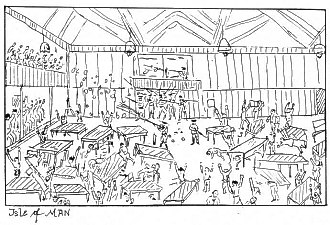
The riot was the subject of an inquiry, and was well publicised in the British press. Rumours abounded too of similar bloody riots at the larger camp, Knockaloe, near Peel, on the west coast of the island, where some 20,000 men were eventually interned. There, as the reports went, internees were forced into their damp huts at machine-gun point, and shot if they failed to do so.
Of the Isle of Man camps, Dunbar-Kalckreuth (p. 155) writes: "What perhaps the French understand by Devil"s Island and the Russians by banishment to Siberia, that place to the prisoners in Alexandra Palace is the Isle of Man, in the far-off Irish Sea." 10
The attitude adopted however by Cohen-Portheim is altogether more flippant. He remarks (p. 29): "Perhaps part of the punishment in the Isle of Man would be to have Hall Caine read out aloud to one".11
In actual fact there appears to have been only one murder at Knockaloe during the whole course of the war, and that came on 15 May 1916, and involved only the guards themselves,when the nerves of Sergeant Williams finally frayed through, and he shot Colour-SergeantMalings dead, "for being a bastard and a cur". (Mona's Herald, 17 May 1916).
But before the internees could reach these Isle of Man camps, they had to report to UK mainland transit camps. Dunbar-Kalckreuth (1940: 100) describes the one at Stratford to which he had to report:
"German waiters, barbers, musicians and dock-workers provided the greatest contingent, all the dialects of Germany and Austria suddenly rang around my disaccustomed ear and generated a feeling of being home. The men had been waiting here since early morning, and the smoke from all the many pipes and cigarettes obscured the room. I, too, stuck a Navy Cut in my mouth and asked for a match, and in this way got into conversation with an erstwhile City clerk. Sitting opposite me was a completely crippled dwarf; what would anybody think he had to do with the sinking of the Lusitania?" 12
"The houses of the recently Zeppelined little town were full to the brim with inquisitive people, and threats and curses poured down on us from all windows, as though we had dropped the bombs. Photographers took pictures of our procession through the town for the newspapers, and tomorrow at breakfast millions of respectable citizens will look at these pictures and think: 'We"ve got a really splendid government, full of action, don"t you think!' "13
Cohen-Portheim (1932:29/30) recounts:
The journey to the Isle of Man was terrible. We were marched through streets to the station, flanked by soldiers with drawn bayonets. The population must have known this was due, for in spite of the early hour the streets were full of a hostile crowd. The memory of a recent Zeppelin raid was fresh with them; this must have appeared to them as a sort of revenge. They spat, they insulted, they jeered, they threw things. I had been so utterly unprepared for this that I could hardly believe it was happening. Perhaps it was happening to somebody else, or was it a nightmare? Only one face stood out from the crowd, horribly real, that of an old woman with wild wisps of white hair blowing about it. She grimaced furiously and shouted, ""Uns!" [Huns], then she grinned and nodded and said in a lower tone and with a curious sort of satisfaction, as if to herself: "Biby- killers!" [baby-killers]. Then again the furious "Uns," the smug "Biby-killers". Her voice seemed to follow me all the way. She was quite drunk.
Dunbar-Kalckreuth was eventually transferred to Knockaloe in November 1915. His first impressions of the Camp were as follows (1940: 159):
"The heavens wept; a whistling, blustering shower of rain was pouring down. Damp grey sadness all around. Finally we arrived and clapped eyes on unending rows of black-tarred huts, dwelt in by twenty-five thousand civilian prisoners. Nevertheless, everything seemed deserted. The collection of tents was divided into four camps, each with seven compounds. Each one separated from the next by triple barbed wire, house-high and electrified. Everything here was pure military as in a prisoner-of-war camp. Each camp was in the charge of an English sub-commandant, every compound, each a thousand men was in the charge of a sergeant. The principle of 'isolation' was applied completely here. (p. 162) How did things look now, in the new 'home'? Between the thirty straw-beds stands a table for the meals. Acrid clouds of smoke dim out the meagre lighting, but at least they block out the horrible other smells." 14
Cohen-Portheim arrived in the July of that year. His impressions are entirely different (1932: 33):
My first impression on seeing Knockaloe Camp in daylight was one of delighted surprise- stepping out of the hut I found radiant sunshine, marvellously pure and bracing air, and a panorama of turf-clad hills. [...] Knockaloe was considered the most distasteful of all camps, the one where hardships were worst and conditions most unpleasant, that is why I feel apologetic to my fellow-prisoners when I state that I rather liked being there. It is only fair, however, to add that my stay there was short and that we had marvellous summer weather.
None the less, as Dunbar-Kalckreuth (1940: 153) points out, the Isle of Man had already ceased to be a holiday island and had become "the Isle of Men": Die Männerinsel. And there were men of all kinds, from all walks of life, at Knockaloe. Cohen-Portheim describes the community thus (1932: 41/42):
In the first days it had been a rabble, or rather two rabbles, for when our rabble arrived the camp was already half filled with a previous batch of prisoners. The two batches were very unlike. Ours consisted mostly of men who had lived for years, in some cases nearly all their lives, in England: business-men, merchants, well-to-do people, but also waiters, hairdressers, small tradesmen. Our predecessors were entirely different. They were people who had been taken off steamers and cargoes, Germans or others. They were mostly sailors, but there were a good many nondescript and some rather romantic individuals amongst the lot. I don't know the reason of this incongruous mixture. It was rather exceptional, for the authorities tried as a rule to keep the classes separate. There was a perfect example of that policy in one of the compounds of Knockaloe which was inhabited solely by men whom the French papers invariably allude to as "tristes individus" or as "peu intéressants," which means that they live on the earnings of women more poetically called "filles de joie." There had been, I learnt, a flourishing trade in that article of export from Hamburg to London, and these tristes individus had followed the daughters of joy in order to keep an eye on them. The neighbourhood of Tottenham Court Road had been their gathering-place, but at the outbreak of war the men had been interned and later on sent to Knockaloe. [...]
(1932: 44) Nearly 50 percent. of the inmates were sailors; of the other 50, roughly 40 had been waiters, barbers, small tradesmen, or servants. The remaining 10, the capitalist class, was composed of business-men or young clerks. There was no one over 50 (for men above military age were repatriated on both sides), there was no one under 18 years of age; it was a society without women, without children, and without old people.
Violent types were in the camps, too, as Dunbar-Kalckreuth (1940: 104) remarks of the internment ship at Southend: "There are enough violent elements on board, many from Whitechapel, whom on land you wouldn"t wish to meet up with on your own." 15
These, he tells us, and the sailors, offered their services as a Schwarze Hand [Black Hand] to beat up, for a price, anyone you wished. Fortunately, some of this energy was later chanelled positively, and Cohen-Portheim remembers the hill in the camp at Knockaloe as being the birthplace of German boxing. He recounts us (1932: 57):
Boxing was unknown in Germany before the war, the first boxing lessons to some of the future professionals were given there by men who had learnt it in England. Many of the internees no longer had any income. If money did arrive for you, it was paid into the Camp Bank and doled out at the rate of £1 a week. As a result of this, society at Knockaloe became divided into two classes, those with money, and those without it.
He continues (1932: 44),
the latter were quick to pick up what they could where they could: There were at least one hundred men or youths anxious to clean your shoes, and never in my life have my shoes looked so brilliant and hade been cleaned so many times a day, though the circumstances really did not call for it. We had eighty barbers, but I could do no more for them than be shaved once a day, which sufficed, however, to make me highly popular with them. Their charge was one penny, but they did not object to the degradation of a tip of a halfpenny ore more.
And Dunbar-Kalckreuth reports also (1940: 187), ."Shaving costs five pfennigs, for two suits of homespun-cloth I was charged only one hundred and forty marks." 16
Added to shoe-polishers, tailors, and shavers, there were wood-carvers willing to make things to order, and painters willing to paint your portrait. And if that was not sufficient, there was the canteen, the bar, the hospital, gambling, and the endemic 'Black Market' (Schiebung) , all of which would quickly relieve a 'plutocrat' of his money (Cohen-Portheim 1932:44/45).
Life in the camps was, however, monotonously drab, and Cohen-Portheim (1932:31,36) reports that nowhere was there any possibility of privacy. The war might last for ever, and none of the internees knew what to expect at the end of it, or whether anything would still be there to return to. These thoughts preyed on the prisoners' minds. Dunbar-Kalckreuth expresses his own feelings about it thus (1940: 302):
"Just as beasts of prey run restlessly back and forth in their cage to no purpose, so also one's thoughts, driven by inner turmoil, begin once more to circle round, back and forth, ever focused on the eternal question: "How much longer? "... This has grown in the meantime to be a phrase of greeting, for which one no longer expects to receive a reply." 17
Many of the men began to suffer physical symptoms, of a type that became known as 'barbed-wire sickness', Drahtzaunpsychose, and affected them in one particular way. Cohen- Portheim describes it thus (1932: 86):
No one could stand staying in the hut for long; one soon developed a habit of rushing out every ten minutes or so. That habit became so much of a second nature that I found it very difficult to get rid of again in later years.
One way out of this situation was to occupy the mind. Some men occupied it with religion, and a branch of the Liverpool Lutheran church became well-established at Knockaloe. However, most men were 'kirchenfremd' [church-alien], and not interested in conventional religion. They turned instead to spiritualism. Both Dunbar-Kalckreuth and Cohen-Portheim report that this was much practised in the camps, and that table-rapping, though tedious, sometimes produced predictions that later proved to be true. Dunbar-Kalckreuth and his table-rappers were for instance able to predict the name of the new allied commander-in- chief. He tells us (1940: 189):
"To the question of who would lead the French, it was not the name of Joffres that came up, but one that no one ever yet had heard. We spelled out F, O, C, H." 18
"We huddled together in this way for many nights, and there was always something to entertain us. Sometimes a goblin came up, probably a native ancient Celt, who then with a forceful kick turned the table upside down, or pushed it into the corner, frightening us badly; or else he caused the washbowls and glasses to rattle, threw pictures down from the wainscot and breathed icily into our faces. Since we were all sober and nobody wished to deceive anybody else, these phenomena were to say the least of it very strange, which for a while removed us from our banal reality." 19
Less unpredictable entertainments were provided by the Camp library, which was well-stocked with books of all kinds, (a complete index was later published by the Deutsche Dichter-Gedächtnis-Stiftung, Hamburg). But if the library didn't please you, or you couldn't read, there were the camp orchestras and choirs, the camp theatre and the silent films. Of the musicians, Cohen-Portheim remarks (1932: 93/94):
Amateur musicians were innumerable, from quite good to excruciatingly bad, and between them all they managed to form an orchestra which became quite creditable in time. It performed twice a week or so in the different camps, being one of the very few institutions which was the common property of the three. Music was one of the saving graces of camp life, but, unfortunately, practising music was one of its worst drawbacks.
The theatre had a great following, and probably flourished best at Douglas Camp, where there was a Deutsches Theater [German theatre]. Many of the internees had been actors, clowns or acrobats. They were keen to get back to the stage. Productions were numerous; for September 1916, for example, Dunbar-Kalckreuth records in his diary (p. 220): "The theatre has been very busy, one after the other it put on 'Hans Huckebein', 'Die von Hochsattel', 'The White Horse Inn' and Thoma's 'Moral'."21 Other plays performed included Georgettes Dilemma, Mutter Landstraße, Das große Licht, Alt-Heidelberg, Familie Schimek, Heimat, Die beiden Seehunde, So'n Windhund, Max Halbe's Strom, Gorky's Nachtasyl, Langye's Taifun, Schnitzler's Literatur, Die letzten Masken, and Das Abschiedssouper. Most popular, however, judging from frequency of performance was Otto Ernst's Flachsmann als Erzieher,21 which seems to have inspired Cohen-Portheim in 1920 to publish his own book about problems he had faced during the war, under the title of Asien als Erzieher ("Asia as Educator").
But the 'Männerinsel' was of course simply that, a society of men, and any female roles in the plays, which even included 'Raub der Sabinerinnen'22, had to be taken by men. Cohen-Portheim (1932: 147) relates how he was greatly impressed by this:
Certainly the most astonishing among the actors were those that specialized in female parts, and they never ceased to surprise me. At first, what you saw on the stage were men rather clumsily disguised as women and about as convincing as the disguised undergraduates of Charley's Aunt, but this changed very quickly and they developed into very plausible actresses.
If there were no women on the stage, there were few of them anywhere else in the camps, except perhaps for the wife of Mr Cunningham. Of her, Dunbar-Kalckreuth remarks (1940: 218):
"Mrs Cunningham, Specky four-eyes, whom one can occasionally see in the kitchen, is the only representative of the'Fair Sex'; however, she makes us just as hungry for this as she does for what she cooks for us"23
Men had to be content with dreaming.
Cunningham himself was generally known as 'Schlauschinken',24 that being a translation of his name, and it seemed to fit, as he was generally perceived to be living a life of luxury off the backs of the internees. Such derogatory nicknames were common amongst the men in the camps: Asquith, for example, the British Prime Minister, was reduced to 'Arschwisch' (Dunbar, 1940: 231).26
The internees were allowed to celebrate patriotic events, such as Kaisers Geburtstag [Emperor's Birthday], the German one in January, and the Austrian one in August. This, as well as Christmas, was an opportunity for a bunter Abend [musical evening]. The Kaisers Geburtstag of 1917"was celebrated with a gymnastics display; when the time came to give three cheers for the Emperor, even the English officers rose to their feet" (Dunbar, p. 239).27 These were no occasions for hate, even though amongst the archive materials in the Isle of Man is a very dishevilled and badly-typed copy of Ernst Lissauer's Haßgesang gegen England28. If there was hate, as Cohen-Portheim remarks (1932: 89), it was against:
the men who draw their soup through their teeth, clean their ears with their fingers at dinner, hiccough unavoidably when they get up from their meal (a moment awaited with tembling fury by the others), the men with ever dirty hands, the man who will invariably make the same remark (every day, year after year) as he sits down-and who is quite an inoffensive good-natured sort of creature otherwise-the man who lisps, the man who brags, the man who has no matter what small defect or habit you happen to object to.
Or it was the traditional hatred for the Jews. The Jews had their own camp in Douglas, which the Camp Echo of December 1915 (p. 12) described as "This coast as Jewish as can be.!"29
However, lectures also provided a way out of boredom. Anyone who knew anything about something was allowed to provide entertainment, the catchphrase being Germania docet, "Germany teaches". As Cohen-Portheim (1932: 92) puts it: It did not matter much at that time what the lecture was on or what it was worth, people were only too glad to while away an hour. Then people began teaching and learning, languages chiefly, but there were also courses in history and various branches of science. Typical themes of 1915 (Camp Echo, No. 5, October 1915) were "Five Years of Life in a Monastery" (Fünf Jahre Klosterleben), "Paper manufacturing" (Papierfabrikation), "German Mineworkers" (Deutsche Bergarbeiter), and "Dialect-free pronunciation of Standard German" (Dialektfreie Aussprache des Hochdeutschen). In time, a belief grew up that these lessons formed part of a university course, that would lead to a validated degree in Germany. Cohen-Portheim (1932:93) dismisses this as "a pathetic delusion".. Yet all these things had to be advertised, and that was the job of the camp newspapers, along of course with their other job, general edification. It seems, however, that as early as 1914 additional uses had soon been found for the camp newspapers (Camp Echo, No. 1, December).
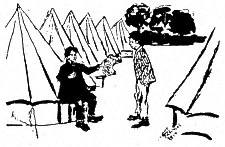
A: It's really a good idea, this Camp newspaper. Now at least we can stuff our trousers and shoes with it 34
The early issues in the camps were produced on duplicating machines, or printed locally, which meant that the type-faces were English, and umlaut had to be written as a digraph.32 Eventually, however, on the closure in 1916 of the camp at Stobs in Scotland, a German roman-face lithograph press with all the umlaut vowels was transferred from there to Knockaloe, and thereafter entered full use. Amongst the newspapers, the regular weekly was the Lagerkalender,36 less frequent publications being Camp Echo, Die Lagerlaterne,37 and Das Schleierlicht.38 Later there was Lager-Ulk39, Lager-Zeitung40 (which boasted a circulation of 4,000), Lager-Echo, Unter Uns,41 Camp-Literatur, Werden,42 and Quousque tandem, which translates into German as "Wie lange noch?".43
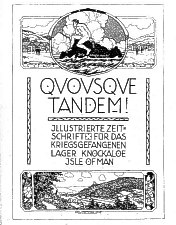
Quousque tandem 44
The names behind these publications have, as far as I am aware, never been followed up by research into their subsequent careers. They include Max Horner, editor of Lager-Echo; A. Seyfried, editor of Unter Uns; E. Murr, editor of Lager-Ulk; R. Hartmann, editor of Werden; H. Siemer-Oldenburg, editor of Das Schleierlicht; H. Bünnig, editor of Camp-Echo; R.M. Conrad Kirchner, editor of Camp-Literatur; and two poets, Georg Wolfsteiner, and H.C. Altman, the latter of whom also produced a German version of that immortal hit,45"You called me baby-doll a year ago; you said that I was very nice to know"; which in German became: "Du nanntest Herzchen mich vor einem Jahr; Du sagtest, ich sei net und lieb fürwahr". It was billed as"Der grosse Schlager der Revue Halli,Halli,Huhu..., gesungen von A.O. Francke".44
Both Cohen-Portheim and Dunbar-Kalckreuth were repatriated in 1918 to Germany by way of the port of Boston on the east coast of England and a short stay in a camp in Holland, which had remained a neutral country. What they found on arrival in Berlin is a different story. As for the rest of the men, they were slow to be sent back, and in many instances were used as cheap labour. Eventually towards the end of 1919 the camps were cleared.
As a joke in the Camp Echo of December 1914 puts it in a conjectured conversation of mother and child in 1950:
"LITTLE FREDDY: Mum, what are those ancient-looking buildings?
MOTHER: Well, dear, those are the lake dwellings of years ago, the ones the German prisoners used to live in." 44
Nowadays, not one trace of the old Knockaloe exists, and the site is now covered by an experimental farm. Of the dead buried in St. Michael's church only three graves remain, Turkish ones. All the German internee dead were transferred in the 1960s to the German war cemetery at Cannock Chase, in Staffordshire.
1 Theodor Rudolph Carl Clewing (1884-1954), opera singer, stage and film actor.
2 German text: "ein sehr beweglicher Herr, der mich stark an den Schauspieler Clewing erinnerte, doch hatte er rötliches
Haar und dazu im Gesicht und auf den Händen die üblichen häßlichen Sommersprossen.
- The Germans saw freckles as a blemish associated with cuckoos. Dunbar-Kalckreuth could have derived this description from
Richard Harding Davis, Winston Churchill, New York: C. Scribner's sons, 1906: '[Churchill] was a slight delicate
looking boy, with many freckles and hair which threatened to be a decided red'.
3 English translation: "Genuine Thuringian meat and sausages; German sausage factory and delicatessen, 37, Charlotte Street;
Royal Mail German restaurant and beer hall - Munich Löwenbräu and Pilsener beer from the barrel."
4 Julian Symons, Horatio Bottomley - A Biography. London. 1955, p. 165.
5 J.C. Bird, Control of Enemy Alien Civilians in Great Britain 1914-1918 , p. 58.
6 J.C. Bird, op. cit. p. 89f.
7 Minutes of the Finance Committee. Freund did not wish to become naturalised, and at the end of the War returned to Germany,
where he seems to have taught at the University of Berlin and lived in Charlottenburg. In 1925, he applied to the University
for his back-pay from July 1915 to December 1916. The Finance Committee"regretted that they were unable to comply with
that request".
8 HMT 'Hired Military Transport'. A former Canadian passenger liner, sunkunk by German submarine, 13 August 1915.
9 Extracts from the Disturbances Nov. 19, 1914, inquiry of 20 and 17 November 1914. Douglas: November 1914.
10 German text: "Was den Franzosen vielleicht das Pfefferland und den Russen die sibirische Verbannung bedeutet, das
ist für die im Alexanderpalace Gefangenen die Insel Man im fernen Irischen Meere."
11 Hall Caine (Sir Thomas Henry Hall Caine, 1853-1931) was the Isle of Man's most famous novelist.
12 German text: (1940:100) Deutsche Kellner, Friseure, Musiker und Dockarbeiter stellten das größte Kontingent,
alle Dialekte Deutschlands und Österreichs umklangen plötzlich mein von ihnen entwöhntes Ohr und erzeugten
ein Heimatgefühl. Die Leute hatten schon seit frühem Morgen hier gewartet, und der Rauch der vielen Pfeifen und
Zigaretten verfinsterte den Raum. Ich steckte mir auch eine Navycut in den Mund, bat um ein Streichholz und kam so ins Gespäch
mit einem bisherigen City clerk. Mir gegenüber saß ein ganz verkrüppelte Zwerg; was der wohl mit dem Untergang
der "Lusitania" zu schaffen hatte?
13 German text: (1940:102) Bis zu den Dächern waren die Häuser des erst kürzlich von Zeppelinen heimgesuchten
Städtchens [Southend] mit neugirerigen Menschen besetzt, und Droh- und Schimpfrufe ergossen sich aus allen Fenstern
auf uns, als ob wir die Bomben geworfen hätten. Photographen knipsten unseren Zug durch die Stadt für die Zeitungen,
und morgen beim Frühstück werden Millionen ehrsamer Bürger diese Bilder betrachten und denken: 'Wir haben
doch eine famose tatkräftige Regierung'
14 German text: (1940:159/160, 162) Der Himmel weinte, ein pfeifender, tobender Regenguß stürzte herab. Nasse
graue Traurigkeit ringsum. Endlich kamen wir an und erblickten endlose Reihen schwarzgeteerter Baracken, die von fünfundzwanzigtausend
Zivilgefangenen bewohnt wurden. Das ganze Lager in vier Camps zu je sieben Compounds geteilt. Jedes vom anderen durch dreifachen,
haushohen und elektrisch geladenen Stacheldraht abgetrennt.
Das Prinzip der 'Isolierung'war hier vollkommen durchgeführt. (p. 162) Wie sah es nun im neuen 'Heim' aus? Zwischen
den dreißig Strohsäcken steht ein Tuch für die Mahlzeiten. Beißende Rauchschwaden verfinstern die
kärgliche Beleuchtung, übertäuben aber wenigstens die schrecklichen anderen Gerüche.
15 German text (1940:104) Es sind genug gewalttätige Elemente an Bord, viele aus Whitechapel, denen man an Land nicht
allein begegnen möchte. - Since Jack the Ripper(1888) Whitechapel had become well-known to the Germans as a den of
thugs and thieves.
16 German text (1940:187) Rasieren kostet fünf Pfennig, für zwei Homespunanzüge wurden mir nur hundertvierzig
Mark angerechnet
17 German text (1940:302) Wie die Raubtiere im Käfig unruhig und zwecklos hin und her laufen, so beginnen auch die
Gedanken wieder, von innerer Unruhe getrieben, hin und her im Kreise zu laufen, um den Mittelpunkt der ewigen Frage "Wie
lange noch? ... (p. 307) Sie ist inzwischen ein Grußwort geworden, auf das man keine Antwort mehr erwartet.
18 German text (1940:302) Auf die Frage, wer die Franzosen anführen würde, kam nicht der Name Joffres, sondern
ein noch nie gehörter. Wir buchstabierten F, O, C, H.
19 German text (1940:189) Viele Nächte hockten wir so zusammen, und immer unterhielt uns etwas. Mitunter kam ein Kobold,
wahrscheinlich ein einheimischer alter Kelte, der dann mit der Kraft eines Fußtrittes den Tisch umwarf oder in die
Ecke stieß, so daß wir furchtbar erschraken, oder er brachte die Waschschüssel und Gläser zum lauten
Klirren, warf Bilder von der Lamperie herunter und hauchte uns eisig ins Gesicht. Da wir alle nüchtern waren und keiner
den anderen täuschen wollte, waren das doch immerhin seltsame Phänomene, die uns zeitweise der banalen Wirklichkeit
entrückten.
20 German text (1940:220) Das Theater ist sehr fleißig gewesen, es führte nacheinander 'Hans Huckebein' , 'Die
von Hochsattel', 'Das weiße Rößl' und 'Moral' von Thoma.
21 'Flachsmann as educator'
22 'The Rape of the Sabine Women'
23 German text (1940:218) Frau Cunningham, die Brillenschlange, die man gelegentlich in der Küche sehen kann, ist die
einzige Vertreterin des 'schönen Geschlechtes', sie macht aber ebensowenig hungrig auf dieses, wie auf das, was sie
uns kocht.
24 (1940:186) Schlau 'cunning', Schinken 'ham'
25 (1940:321) Arschwisch 'arse-wipe'
26 German text (1940:239) wurde mit Schauturnen gefeiert; beim Kaiserhoch erhoben sich auch die englischen Offiziere
27 Song of Hate against England, eg., wir haben alle nur einen Haß / wir lieben vereint, wir hassen vereint / wir
haben alle nur einen Feind: / England"
We all have only one hate/ we are unted in love, united in hate/ we all have only one enemy: /England
28 German text Die reinst jüd'sche Küste!"
29 German text Es ist doch wirklich eine gute Idee, diese Lagerzeitung. Da kann man sich doch jetzt wenigstens Hosen und
Schuhe damit stopfen.
30 ae,Ae, oe, Oe, ue, Ue for German ä, Ä, ö, Ö,ü, Ü
31 Camp Calendar
32 Camp Lantern
33 Dusk
34 Camp Merrimant
35 Camp Newspaper
36 Between Ourselves
37 Development
38 The phrase is taken from Cicero's first oration against Catilina: Quousque tandem abutere, Catilina,patientem nostram?
"˜How much longer, Catilina, will you wear out our patience?"
39 The text reads: "˜Illustrated magazine for the War Prisoners" Camp Knockaloe, Isle of Man
40 Popularised by Al Jolson, 1916
41 The big hit of the Revue Halli, Halli, Huhu...sung by A.O.Franke
47 German text:
DER KLEINE FRITZ: "Mama was sind denn das für altertümliche Gebäude?"
MAMA: "Ja, Kleiner, das sind die alten Pfahlbauten von früher, wo die gefangenen Deutschen
drin gehaust haben.
Anglo-German Publishing Co. (1913) Die deutsche Kolonie in England. London, 15 Craven Street, Strand.
Bird, J.C. (1986) Control of Enemy Alien Civilians in Great Britain 1914-1918. New York and London, Garland.
Cohen-Portheim, Paul (1920) Asien als Erzieher. Leipzig, Klinkhardt & Biermann.
Cohen-Portheim, Paul (1932) Time stood still - My internment in England 1914-1918. New York, Dutton.
Davis, Richard Harding (1907) 'Winston Churchill' in Real Soldiers of Fortune. London, Heinemann.
'Disturbances' (November 1914) Inquiry of 20 and 17 November 1914. Douglas, IoM.
Drower, Jill (1982) Good clean fun: the story of Britain's first holiday camp. London, Arcadia Books.
Dunbar von Kalckreuth (1925) Das alte Rom. Kulturhistorische Wanderungen. Erster Teil. Leipzig, Quelle & Meyer.
Dunbar, Frederick L. (1935) Königin Christine. Der Roman ihres Lebens. Leipzig, Quelle & Meyer.
Dunbar- v. Kalckreuth, F.L. (1937) Von Tausend Dingen. Von der Welt im Großen und im Kleinen, vom Leben, vom Tun der
Menschen und von den Dingen auf Erden. Leipzig, Georg Dollheimer Verlag.
Dunbar, F.L. (compiler) and Wheeler, Harold (editor) (August 1939) Everybody's Book of Facts. London, Odhams Press Limited.
Dunbar-Kalckreuth, F.L. (4 May 1940) Die Männerinsel.
Leipzig, Paul List. Selected translations by Gerald Newton.
Sheffield and Rotherham Independent newspaper (1819-1938), archived in Sheffield University Western Bank Library.
Symons, Julian (1955) Horatio Bottomley - A Biography. London, The Cresset Press.
Wheeler, Harold (ed.) (1937; 2nd edn., February 1938) How much do you know? A book of fascinating questions and answers
on every subject. London, Odhams Press Limited.
Wilda, Johannes (1903) Reise auf S.M.S. Möwe. Streifzüge in Südseekolonien und Ostasien. Berlin, Allgemeiner
Verein für Deutsche Litteratur. Neudruck (2014), Vero Verlag, Norderstedt. Selected translations by Gerald Newton.
While he was on the Isle of Man, Frederick Lewis Dunbar's name was just that: "Frederick Lewis Dunbar". His father was Frederick Parker Dunbar, an American who became a naturalised German in order to join the German Imperial Navy, where he later captained the Corvette Research Vessel Möwe (Seagull) round the south seas about 1902-5. Parker Dunbar later left the German Navy because of tropical illness, but was recalled in the summer of 1914, to spy on the British Grand Fleet at Scapa Flow. He was captured, and interned on the Isle of Man. It is to this man that Frederick Lewis dedicates Die Männerinsel
His father's marriage seems to have ended in divorce and re-marriage around 1907/8. Parker Dunbar's first wife, Elisabeth Block (b. 1866), remarried in 1931, the year in which she died. The man she married, also in 1931, was Richard von Kalckreuth (b. 1878-d. not known), a doctor of law and government assessor to Royal Prussian Court, Army lieutenant and Honorary Knight of the Protestant Order of St. John. Frederick Lewis assumed his prospective step-father's family name, and by 1925 was already styling himself Frederick Lewis Dunbar-von Kalckreuth, or Dunbar-Kalckreuth, or just Dunbar (as it suited him).
Dunbar-Kalckreuth's account survived, either passed on to confederates in London before he came to the Isle of Man, or else handed over (in many volumes, so he tells us) to the safe-keeping of Joseph Cunningham in 1918. It was 22 years later, when he used what he could still find of these diaries to compose his 1940 account of life on the Isle of Man. Frederick Lewis Dunbar began his diary in the July of 1914, in St. Leonard's-on-Sea, a suburb of Hastings on the Kent coast of England. He had been sent there to join the 9-to-16-year-olds at the Hillcrest School summer course run by a former Vicar of St. Leonards, Mr Mather Smith, and his sister Miss Lilian. The only problem with this was that while Frederick Lewis was pretending to be 16 years old, in actual fact in the summer of 1914 he was 25, and well over the conscription age to the German Army (18). And this is the basis upon which the diary proceeds. After 154 pages of preliminaries, Frederick Lewis eventually arrives on the Isle of Man (Knockaloe) aged 26 in the November of 1915.
Why didn't Frederick Lewis publish his Isle of Man diary until 1940? Probably because he thought his work on Renaissance Rome (1925) was far more important, and lucrative. After that publication, he turned to Queen Christina of Sweden as material for an historical novel (1937), then via various paths to Odhams Press, London, where in 1937/8 he collaborated with Harold Wheeler, editor of the enormously successful How much do you know? and in 1939 on Odhams Press Everybody's Book of Facts.
At that stage World War 2 was underway, and internees on 'Die Männerinsel', guarded as they had been, in the far-away Irish Sea by brutal soldiers welding ferociously long bayonets (as depicted on the dust-sheet of Die Männerinsel) - well, who knew, or even cared, if Frederick Lewis's account was true, or not, so long as it was a good anti-British read?
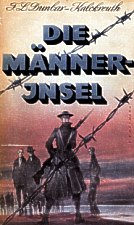
These diary entries are the author's original notes, written down at intervals of individual days progressively from month to month, from the time he was overtaken by the War in England, after which he spent the years up to 1918 in various English civilian internment camps-his last being one of the infamous Isle-of-Man camps-until his return through Holland to Germany, when he arrives back to find Germany in the November days of 1918 in a state of collapse. The entries are therefore of the greatest documentary value and of impacting importance for the present-day. The book provides endless revelations as regards English methods of warfare against civilians. It rises up time and time again to severe indictment, but also to indictment of the German privy-counsellor system of those days, which treated the English prisoners in the German Empire with the greatest courtesy, while hide-bound England treated its internees on the pattern of the concentration camps of the Boer War. The reader gets a very vivid image of the hell in a camp like this, where more than one thousand men of all professions, levels of society and of age had to live crammed up together. The author reveals the wretched conditions caused by English German-haters. "The task of making the life of people here as uncomfortable as possible was perfected to a fine art", it says at one point in the entries.1 Mental breakdown and physical agonies wear the prisoners down. Despite this, and through social activity, the Germans try to set up a vibrant, sociable and intellectual life. - Valuable, too, are the images of wartime England, such as the Zeppelin raids, the effects of the German submarine warfare, or else the wartime propaganda of the English Government.
Dunbar-Kalckreuth has been an excellent observer and has been able to pass on his experiences and feelings appropriately. There is no impression of personal animosity; a great collective destiny is taken in hand. Today's reader reads the depictions with burning interest, and these become a warning to the conscience of the world. Time and time again one is reminded of Dostoyevsky's book "The House of the Dead", which it also comes close to in inner tension.
1 Page 171 (November 1915). [Actually this refers only to their having to stand up for 5 hours in the open air while a tally was taken.]
|
|
||
|
|
||
| Any comments, errors or omissions gratefully received The
Editor Text © G Newton HTML Transcription © F.Coakley , 2018 |
||